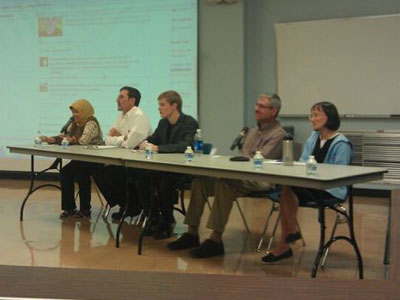Tri Mumpuni has a passion for the poor. Mumpuni, the Hennebach lecture guest speaker, described her experiences and role in using micro-hydro technology to as she works to bring power to those less fortunate.
For several decades, Mumpuni has been coordinating renewable energy projects in rural areas of various countries and has been very pleased with the results as sustainable energy has been established in many rural villages across the world. In Indonesia, for example, 100 million of its 243 million citizens do not receive power to their homes. These 100 million people reside in roughly 30,000 villages that have no electricity. In the few villages that do receive government subsidized power, the voltage is reduced dramatically by the time it reaches them. This lack of electricity can be attributed to the fact that the Indonesian government has a central power grid that attempts to spread power all across the main islands, as opposed to having smaller, local sources of power. It is problems like these that Mumpuni and her colleagues combat, “Using [their] brain, using [their] heart” in attempting to solve them.
Mumpuni’s solution to this problem is micro-hydro power. Micro-hydro power is the idea of implementing hydraulic power on a much smaller, village-sized scale. Water is diverted from a local river and piped down to a small facility with a turbine and generator, which converts the potential energy of the upriver water into usable electrical energy. This energy is then wired directly into the village for the people, while the water is dumped downriver, unpolluted.
As with all things in life, Mumpuni admits, there are drawbacks that accompany the advantages. Economically, it is nearly three and a half times as expensive to power a village through sustainable micro-hydro plants as it would be to use government-subsidized power. However, the cheaper price is only relevant for the few villages that have the opportunity to connect to the Indonesian central power grid. It is up to Mumpuni to then explain to many villages why sustainable power is worth the extra cost. She demonstrates the impact the system will have on future generations and the benefits of good, clean, sustainable energy.
Then Mumpuni can begin to make the vision a reality. In order to materialize these projects, she first coordinates with outside companies to provide capital for the villages. Then once these micro-hydro plants have been completed, the villages begin to take ownership as they see an increase in income, productivity, efficiency, and overall standard of living. The profits are then split up between the investing companies and the village.
There are two distinct advantages to having a localized, sustainable power source. The first, separation from the national power grid, is a double-edged sword. On the one hand, if the rural villages have their own independent power, the national grid can concentrate their resources on the industries in the urban areas. On the other hand, if any failure occurs on the national grid, the rural villages would be unaffected.
The second, and arguably most important, advantage to sustainable micro-hydro power lies within the future dividends of the community. As mentioned, the presence of electricity in the village allows productivity and efficiency to skyrocket.The village is then able to produce new products that were previously impossible or extremely labor-intensive to make. This result, along with the fact that the village has an increased efficiency, leads to a much greater income for the village. Much of this money is used to improve schooling and health clinics within the village. Mumpuni described this as “a small time in history [where] children can go to school, because the village finally has the money.”
A great example that witnesses to the success of Mumuni’s work is the Indonesian village of Cinta Mekar. With their new micro-hydro power, Cinta Mekar now produces 120kW of power at its peak.
As Mumpuni continues to fight for the poor in Indonesia, she bases her work on three distinct principles that she believes bring about “Intrinsic Empowerment.”
The first is local community respect. Mumpuni understands that sustainable energy cannot be forced on a community, especially due to the overhead costs. Secondly, she notes the importance of participatory development within the project community. It is important that the local villagers take ownership of the project and understand how to run and repair the micro-hydro plant when problems arise. Lastly, she touches on community empowerment, as an electrified village brings greater opportunities and responsibilities.
These basic principles bring about a Humanity-Based Ecology (social business paradigm) and a Growth-Based Economy (commercial business paradigm). It is through these things that “you become a Global citizen-hero and a corporate warrior.”



'Hennebach Lecture: “Renewable Energy Implementation for Rural Economic Development”' has no comments
Be the first to comment this post!